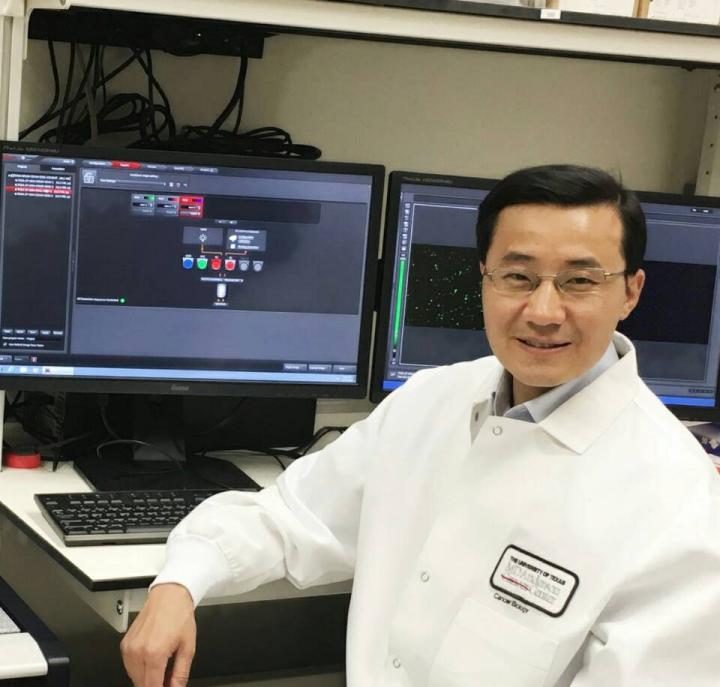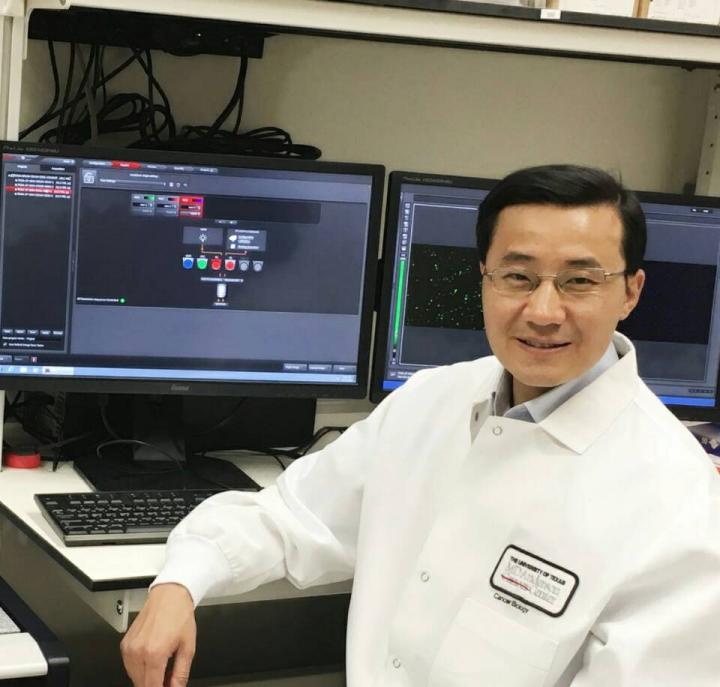
Credit: MD Anderson Cancer Center
Glioblastoma multiforme remains the most common and highly lethal brain cancer and is known for its ability to relapse. Researchers at The University of Texas MD Anderson Cancer Center have identified a pathway by which cancer cells aggressively spread and grow in the brain, opening up new possibilities for treatment.
Study findings were published in the Nov. 17 online version of Cell. Co-authors included Baoli Hu, Ph.D., senior research scientist, Y. Alan Wang, Ph.D., associate professor, and Ronald A. DePinho, M.D., professor, all of Cancer Biology, and Qianghu Wang Ph.D., Bioinformatics and Computational Biology.
"The poor prognosis of glioblastoma relates to the near universal recurrence of tumors despite robust treatment including surgery, radiotherapy and chemotherapy," said Hu. "Our study shows the potential for a new therapeutic strategy based on targeting the mechanisms allowing glioma to re-grow aggressively in the brain."
Hu and his colleagues developed a glioblastoma model to locate glioma stem cells, which, like all stem calls, have the ability to become other cell types. The researchers further found that the gene, WNT5A, when activated, allowed glioma stem cells to transition, leading to invasive tumor growth.
"We uncovered a process by which glioma stem cells mediated by the WNT5A gene become endothelial-like cells," said Hu. "These new cells known as GdECs, recruit existing endothelial cells to form a niche supporting the growth of invasive glioma cells away from the primary tumor, and often leading to satellite "lesions" and disease recurrence."
Clinical data revealed higher WNT5A and GdECs expression in these satellite lesions and recurrent tumors than was observed in the primary tumors, affirming the tie between WNT5A-mediated stem cell differentiation and glioma cell spread throughout the brain, and contributing to the cancer's lethalness.
The study established WNT5A as a key factor in glioma stem cells transitioning to GdECs. The team believes this opens up the possibility for a new therapeutic strategy for patients with glioblastoma.
Recent clinical data show the FDA-approved drug, bevacizumab, did not benefit patients as a first line treatment of recurrent glioblastoma by targeting vascular endothelial growth factors (VEGF). With this new information, the study team proposes an additional therapeutic approach targeting WNT5A and VEGF signaling pathways for recurrent glioblastoma.
"Our preliminary data show that bevacizumab may increase WNT5A-mediated GdECs differentiation and recruitment of existing endothelial cells resulting in no proven benefit to patients with glioblastoma" said Hu. "This new strategy should improve the outcome of brain cancer patients undergoing VEGF therapy, by limiting new tumor growth and invasion, and disease recurrence," said Hu.
###
MD Anderson study team members included Y. Alan Wang, Ph.D., Sujun Hua, Ph.D., Charles-Etienne Sauvé, Derrick Ong, Ph.D., Zheng Lan, Ph.D., Yan Wing Ho, Ph.D., Marta Monasterio, Ph.D., Xin Lu, Ph.D., Pingna Deng, Guocan Wang, Ph.D., Wen-Ting Liao, Ph.D., Denise Spring, Ph.D., Jian Hu, Ph.D., and Ronald DePinho, M.D., all of Cancer Biology; Roeland Verhaak, Ph.D., Bioinformatics and Computational Biology; Jianhua Zhang, Ph.D., and Lynda Chin, M.D., Genomic Medicine; Yi Zong, Ph.D., Epigenetics and Molecular Carcinogenesis; Zhi Tan, Experimental Therapeutics; Lynda Corley and Gregory Fuller, M.D., Ph.D., Pathology; and Erik Sulman, M.D., Ph.D., Radiation Oncology.
Other participating institutions included Dana-Farber Cancer Institute, Boston; Nanjing Medical University, Nanjing, China; Guangdong 999 Brain Hospital, Guangzhou, China; the Fondazione IRCCS Istituto Neurologico C. Besta, Milan; and the University of California, San Francisco.
The study was funded by National Institutes of Health (P50 CA097257, 2P50CA127001, 5P01CA095616, and P30CA16672).
Media Contact
Ron Gilmore
[email protected]
713-745-1898
@mdandersonnews
http://www.mdanderson.org
############
Story Source: Materials provided by Scienmag




